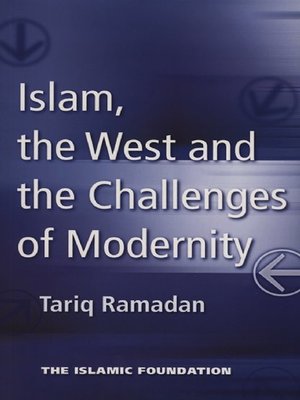
Sign up to save your library
With an OverDrive account, you can save your favorite libraries for at-a-glance information about availability. Find out more about OverDrive accounts.
Find this title in Libby, the library reading app by OverDrive.



Search for a digital library with this title
Title found at these libraries:
| Library Name | Distance |
|---|---|
| Loading... |
Tariq Ramadan attempts to demonstrate, using sources which draw upon Islamic thought and civilization, that Muslims can respond to contemporary challenges of modernity without betraying their identity. The book argues that Muslims, nurished by their own points of reference, can approach the modern epoch by adopting a specific social, political, and economic model that is linked to ethical values, a sense of finalities and spirituality. Rather than a modernism that tends to impose Westernization, it is a modernity that admits to the pluralism of civilizations, religions, and cultures.
Table of Contents:
Foreword
Introduction
History of a Concept
The Lessons of History
Part 1: At the shores of Transcendence: between God and Man
Part 2: The Horizons of Islam: Between Man and the Community
Part 3: Values and Finalities: The Cultural Dimension of the Civilizational Face to Face
Conclusion
Appendix
Index
Tariq Ramadan is a professor of Islamic Studies at the University of Oxford and a visiting professor in Identity and Citizenship at Erasmus University. He was named by TIME Magazine as one of the one hundred innovators of the twenty-first century
|Tariq Ramadan attempts to demonstrate, using sources which draw upon Islamic thought and civilization, that Muslims can respond to contemporary challenges of modernity without betraying their identity. The book argues that Muslims, nurished by their own points of reference, can approach the modern epoch by adopting a specific social, political, and economic model that is linked to ethical values, a sense of finalities and spirituality. Rather than a modernism that tends to impose Westernization, it is a modernity that admits to the pluralism of civilizations, religions, and cultures.
Table of Contents:
Foreword
Introduction
History of a Concept
The Lessons of History
Part 1: At the shores of Transcendence: between God and Man
Part 2: The Horizons of Islam: Between Man and the Community
Part 3: Values and Finalities: The Cultural Dimension of the Civilizational Face to Face
Conclusion
Appendix
Index
Tariq Ramadan is a professor of Islamic Studies at the University of Oxford and a visiting professor in Identity and Citizenship at Erasmus University. He was named by TIME Magazine as one of the one hundred innovators of the twenty-first century.







